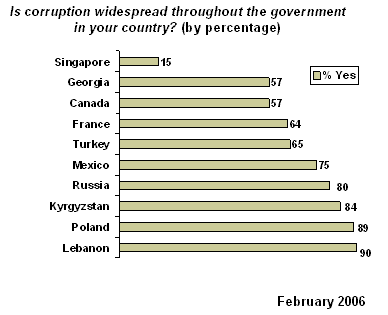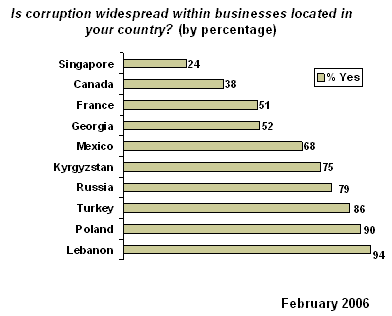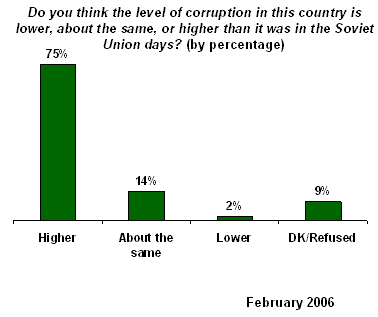GALLUP NEWS SERVICE
Went to St. Petersburg,
greased whatever palms needed greasing
and came back a chairman.
-- Ivan Goncharov, Memoir, 19th Century
PRINCETON -- Recent Â鶹´«Ã½AV Poll results from Russia suggest that the same method that worked for Goncharov well over a century ago is still common practice today. In answering the question, "Is corruption widespread throughout the government in your country?" 80% of respondents gave an affirmative reply. Similarly, 79% replied affirmatively to the question, "Is corruption widespread within businesses located in your country?" The following graphs reveal how those figures compare with results in other selected countries.


Transparency International's annual Perception of Corruption index for 2006 corroborates these perceptions: Russia ranked 121st (out of a possible 163), sharing this rung with Rwanda, Honduras, Benin, Nepal, Philippines, Gambia, Guyana, and Swaziland. Belarus is the only European country that ranks lower than Russia, at 151.
Only 7% of Russians say they are satisfied with efforts to control crime and corruption in the country. By way of comparison, more than three times as high a percentage (23%) claim satisfaction in Italy, Turkey, and Mexico, each of which is commonly recognized to have its own formidable corruption problems. The percentages in the United States (47%), Canada (47%), and France (50%) who say they are satisfied with control of crime and corruption are about seven times as high as that in Russia.
Corruption in Russia stopped being strictly a crime-and-punishment issue long ago, and became a political -- even systemic -- problem. It has been attributed to a wide variety of causes, including the murky and close-knit alliances of those who hold power, the concentration of administrative functions in a centralized apparatus, the significant ongoing presence of the state in the economy and municipal affairs, a subjugated mass-media, a judicial system influenced by the state, and a ponderous Soviet heritage.
Currently, the Office of the Russian Public Prosecutor only acknowledges registering a 1% to 2% incidence of accepting bribes. In stark contrast, Georgiy Satarov, the president of the INDEM Fund and a leading expert on corruption in Russia, argues that the country is seeing the most voluminous blossoming of bribery in its entire history. The total sum of bribes annually meted out by Russians has reached $30 billion, Satarov claims, with the market of "everyday corruption" in which ordinary consumers pay bribes -- for example, in the public health services, in the education system, on the roads, in institutions of higher learning, in Housing Management Agencies, and in child care centers -- comprising about $3 billion of that.
The perceptions of the Russian public tend to fall more in line with Satarov's analysis. Certainly, endemic corruption was characteristic of the old Soviet Union. Yet today, only 2% of Russians believe that the level of corruption in the country has fallen since the Soviet era, whereas 75% say it is now even higher than it was then.

Survey Methods
Results are based on face-to-face interviews conducted in February 2006, with a randomly selected national sample of 2,011 Russian adults, aged 15 and older. For results based on these samples, one can say with 95% confidence that the maximum error attributable to sampling and other random effects is ±2.4 percentage points. In addition to sampling error, question wording and practical difficulties in conducting surveys can introduce error or bias into the findings of public opinion polls.
